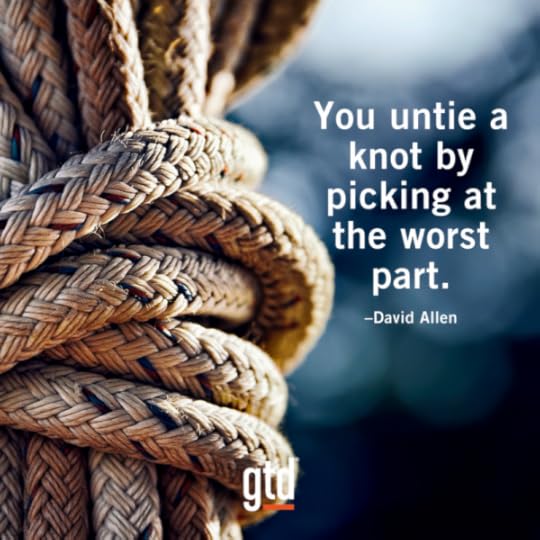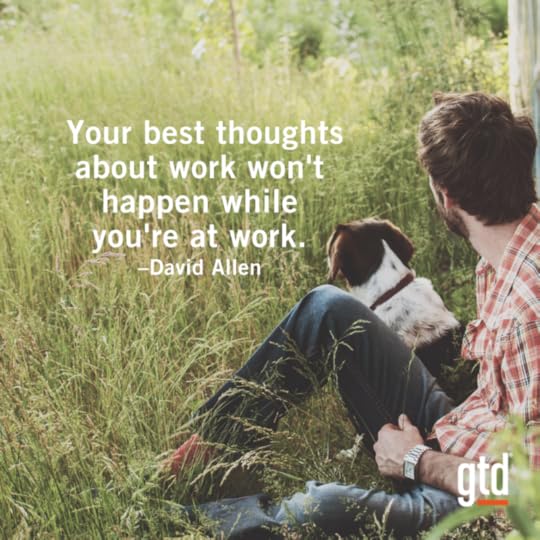David Allen's Blog, page 45
August 7, 2017
Getting Unstuck
Got any knots? What’s your desired outcome to resolve that? What will be true when you can you declare it done? What’s your next action?

August 3, 2017
How’s your altitude aptitude?
Over the years, it has become more and more helpful in my work to help people understand the ecosystem of GTD® (particularly priorities) by framing their thinking and decision-making around my altitude model:
(particularly priorities) by framing their thinking and decision-making around my altitude model:
GROUND: Calendar/Actions – The nitty-gritty this-moment doing level. Call Fred. Buy tires. Draft proposal. Email Susan.
HORIZON 1: Projects – The things you’re committed to finish that one action won’t finish. Give Barbara a birthday party. Set up my new MacBook. Implement this year’s budget. Hire a new marketing VP.
HORIZON 2: Areas of Focus and Accountability – Current job responsibilities and status of key aspects of your personal life. What are your roles and responsibilities re: work? What areas of your personal life need to be maintained at some appropriate level? Given a review of all of those, what projects should you have on your list that you don’t have yet? Any projects on your list you should dump?
HORIZON 3: Goals and Objectives – The typical strategic level. Goals and direction of the organization and your work. Things you want to accomplish personally, in the longer term. Definition of current and new key result areas.
HORIZON 4: Vision – Career, lifestyle choices. Is this the job you want? Are you in the right game? What does success in the long term look, sound, and feel like? Talents, skills, interests.
HORIZON 5: Purpose and Principles – Life. Living the one you want? Quality of life issues. Values, balance, style, inner gifts, personal expressions.
So what about this? Well, too often I find people trying to solve a Horizon 4 problem with a Horizon 2 solution. Or trying to solve a Ground-level problem with a Horizon 5 solution. Doesn’t work—and even worse, it creates deep frustration and confusion because they know somehow that the questions that they are posing are good ones.
Whichever of these levels most has your attention is a fine place to begin, and to reassess its contents for yourself. However, trying to solve an out-of-control inbox (Ground) by agonizing about whether this is the job you should have (Horizon 4) is the Serious Pits. That’s why I usually coach on this scale from the bottom up—if your landing gear doesn’t work, it’s pretty hard to make real decisions from any other level! Getting control of where you are is a prerequisite for healthy thinking about where you should be.
–David Allen
This essay appeared in David Allen’s Productive Living Newsletter. Subscribe for free here.
July 31, 2017
Episode #32 – The Better You Get
David Allen says, “The better you get, the better you’d better get.” This podcast is about how to improve your skills, when you’re already proficient at GTD®. Coaches Meg Edwards and Kelly Forrister will guide you through some of the coaching they would give to a client who already has a solid foundation and plenty of experience with GTD.
Listen Now
Subscribe or Download
The best ways to deal with stress

Understand first that you’re actually IN stress
Determine what’s causing it
Clarify what you’d like to have true in the situation—what’s your desired outcome, at least in terms of how you’d like to be feeling?
Decide if there is a next action you can take to make some positive progress toward clarification and/or resolution
Engage in some activity or focus that you feel will potentially improve the situation for you.
July 14, 2017
Outsmarting Your Mind
 I have the feeling and the hope every now and again that in 25 years what GTD teaches will be such a “given” that we may wonder what it was like to walk around with such pressure and stress from our suboptimal thinking habits.
I have the feeling and the hope every now and again that in 25 years what GTD teaches will be such a “given” that we may wonder what it was like to walk around with such pressure and stress from our suboptimal thinking habits.
The advent of the “knowledge worker” society has given so many of us projects and things to do that are not nearly as clear-cut as work used to be. (Can you ever create a perfect workshop, or write a perfect article for the newsletter?) It has created a world in which we’ve given our minds tremendous work to do. But we’ve also grown up trusting that our minds could (and should) handle it all from beginning to end (because, aren’t they smart!?).
The problem is, much of the pressure I witness going on for people is their mind trying to do things that it doesn’t do very well. Most people are thinking about how they should be thinking about what they should be thinking about. And then trying not to think about that! They’re not finishing the exercise of the thought process required for completing what it should be thinking about, nor ensuring that they have good trustworthy action-level systems in place to manage the task of reminding themselves about the results of what they’ve come up with in that clarifying process.
Our minds seduce us regularly. When you’re thinking of something, some part of you is convinced that because it’s so evident at that moment, it will never forget it, and will supply that information or perspective or thought at the appropriate time and place. If that were really true, that would be great. It’s not. Otherwise you would never even need an external calendar—your head would know exactly where you needed to be when (as well as having a consistently correct view of everything coming toward you in your future!).
When you make agreements with yourself about something (“I would, could, should, might, ought to, etc.”) your mind, dutiful servant that it is, will be glued to that task until it is given further instructions. With no sense of past and future in its short-term memory bank, however, it creates instant and unresolvable conflict if it has more than one thing to do. Learning how to manage this is as straightforward as learning how to scramble eggs. You just have to act from the place that is smarter than your mind.
–David Allen
How is it that our memory is good enough to retain the least triviality that happens to us, and yet not good enough to recollect how often we have told it to the same person? —Duc de la Rochefoucauld
This essay appeared in David Allen’s Productive Living Newsletter. Subscribe for free here.
July 13, 2017
Episode #31 – David Allen talks with Dr. Theo Compernolle
David talks with Dr. Theo Compernolle, a doctor with a 35-year background in medicine, psychiatry, teaching, and research. His most recent book is Brain Chains. You’ll find this interview to be educational, and perhaps challenging, as you learn that we may be using technology in counter-productive ways.
Listen Now
Subscribe or Download
July 5, 2017
GTD Webinars
There are two great live video webinars being offered this month on GTD Connect, David Allen’s online learning center.
1. GTD & Outlook—July 20, 2017
This webinar is packed with practical tips and tricks to get you up and running with a trusted GTD system in Outlook for Windows. Learn how to best structure the Tasks section to track your projects and next actions, effectively manage your email and calendar, use the Notes section for storing reference, and more.

2. Guided GTD Weekly Review—July 27, 2017
Experience what David Allen calls the “critical success factor” with GTD, by going through a complete GTD Weekly Review. You’ll get a taste of all 11 steps of the process, with helpful coaching along the way.

GTD Connect also offers a ton of other GTD content you won’t find anywhere else, including over 100 recorded webinars with the GTD coaches, audio and video library, What’s New with David Allen blog, educational articles, Intention Journal, member forums, and more.
June 30, 2017
Getting (back?) on the wagon with GTD
It all makes sense. You want to do it. And yet, you aren’t doing it. 
If this sounds familiar in relation to your GTD practice, know that you are not alone. The methodology is incredibly powerful, but only to the extent that one actually uses it. Perhaps because of this disparity, I sometimes see clients berate themselves, asking frustratedly why, if they know GTD works so well, they aren’t doing it more.
The good news is that a few simple steps can help you start to make the behaviour changes necessary to get back on the Path of GTD Mastery. Furthermore, you don’t have to reinvent the wheel or take drastic measures to get going. Here are five steps I have seen work time and again.
1. Connect with the inspirational purpose
My colleague Ed Lamont speaks about this very well in his article “Goodbye Discipline, Hello Motivation“. Simply put, carrots work better than sticks (and are much more tasty).
So, why are you doing this GTD thing in the first place? For more time with the family? To impress the boss and get that promotion? So you can feel more relaxed and in control? Take the time you need to really connect with that inspirational purpose, and to reconnect with it as you go along. The real reason you’re doing GTD, by the way, stated as though it is already true, can make a great title for the project in your system about getting back on your GTD game. Be sure to get that written down on your project list straight away. It’s a way of telling yourself that you are serious.
2. Ask yourself: What’s worked before?
You are an adult. You have had to change your behaviour many times in the past to get what you want, and to get where you are now. How did you do it?
One client reflected on training for marathons, and how the new habit of morning runs initially felt awful, but by doing it anyway they soon became enjoyable, even irresistible to him. For me, the approach of making very small inroads works to gradually stretch out my comfort zone. For example, when the dentist told me I needed to start flossing, I started out by flossing just one tooth at night. Eventually the habit of getting out the floss became second nature, and I decided that while I was there and ready, I might as well do my whole mouth. (For more on the power of small steps, see “Why Tortoise Really Won“)
These same principles — starting small, acknowledging it will “feel wrong” at first, doing it anyway — are all transferrable to establishing (or re-establishing) your GTD practice. The more important question is: what has worked for you in the past? Now apply those same techniques to upping your GTD game.
3. Replace old rewards with new
Many habits get established as part of a reward cycle. For example, the habit of spending most of one’s day in the email inbox probably has something to do with the feeling of accomplishment when you complete everything there is to do about an email, and can get rid of it. However, it’s not the best way to get an overview of all your options to be nose-down in email all day.
Instead, see if you can replace the sense of accomplishment about “doing an email” with the sense of accomplishment that comes from clarifying and organising all of your emails into projects and actions, getting the inbox to zero. Likewise, see if you can replace feeling important because you are just so busy with feeling on top of everything because you have done your Weekly Review.
You aren’t giving up the rewards of accomplishment — you are upgrading them, and upgrading your definition of accomplishment in doing so.
4. Debrief the present from the future
This one may sound a little odd, but it can be profoundly useful when you are feeling stuck about how to proceed. First, get in touch with that inspirational purpose from step one. Then, embody it. Imagine yourself fully living within that new paradigm of stress-free success. Then ask yourself: how did I get here?
Just as identifying a clear outcome can often help with the next step, so this kind of “flash forward” exercise can often give you clues as to what has to happen — both in terms of what you are willing to do differently, and perhaps what you may need to be willing to give up — to get you to there from here.
In addition to creating a project in your system about getting back on your GTD game, be sure to add as much of this rich detail as possible as “project support” material to review and reflect upon as you go along.
Your imaginary internal GTD master may also have more practical tips for you along the way, so feel free to “flash forward” and ask questions as often as is useful. You may be surprised at how much you already know.
5. Commit to a new habit
Finally, commit to something new. All this connecting with purpose, rewiring definitions of accomplishment, and strategising with the end in mind still won’t get you back on your GTD game unless you actually do some things differently.
The two most common habits I see people take on that help them get going are the daily review and the Weekly Review. For so many people the siren’s call of email is a great temptation. One simple way to beat it is to review your action lists first before you ever open your email. This simple daily habit, like flossing a tooth, will at least remind you that your lists are there, waiting both to receive new clarified input from email and to be worked from as a better approach than just swimming through email all day.
The second habit that really works to both establish and reboot one’s practice is the Weekly Review. In some sense, in the early days, you are falling off the wagon a little bit each week. It’s the Weekly Review that puts you back on, by re-establishing familiarity and trust with your system, and getting you into a virtuous cycle of more relaxed focus leading to more motivation to keep practicing the GTD principles that create the relaxed focus in the first place. Whenever someone is off their game, we usually start with the Weekly Review.
So, there you have it. In a nutshell: get inspired, get practical, rewire what “winning” means, consult your future self a bit, and then take the plunge and commit to actually doing something different.
There is a much smarter way to work and live. You may not have been doing it yet, but you also may already have many of the answers about what needs to change, why, and how to get yourself back on track. Ask yourself a few good questions, listen to the answers, and then get going.
Good luck, and happy wagonning.
–Robert Peake, Certified GTD Coach & Trainer, Next Actions Associates
This article was originally published on the Next Action Associates blog.
June 23, 2017
The workforce for the next century
The assumption that everyone can and should do everything they have been given to do is an old industrial paradigm that does not hold water for “knowledge workers” who all have tons of projects that could be done infinitely better.
Renegotiating agreements and standards with ourselves and our world is an unfamiliar but required skill set for the majority of the workforce for the next century. –David Allen

June 19, 2017
Your best thoughts about work…
David Allen's Blog
- David Allen's profile
- 1484 followers




